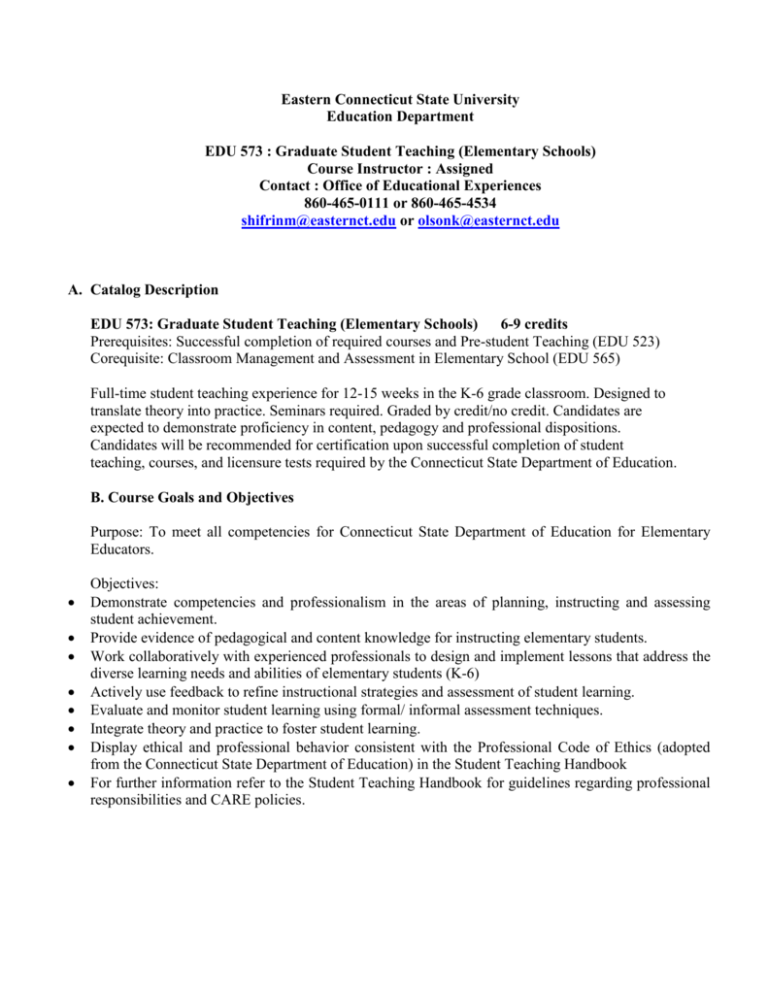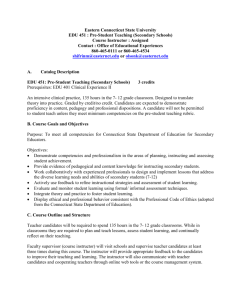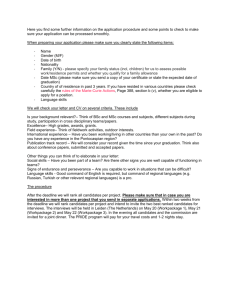EDU 573: Graduate Student Teaching Elementary
advertisement

Eastern Connecticut State University Education Department EDU 573 : Graduate Student Teaching (Elementary Schools) Course Instructor : Assigned Contact : Office of Educational Experiences 860-465-0111 or 860-465-4534 shifrinm@easternct.edu or olsonk@easternct.edu A. Catalog Description EDU 573: Graduate Student Teaching (Elementary Schools) 6-9 credits Prerequisites: Successful completion of required courses and Pre-student Teaching (EDU 523) Corequisite: Classroom Management and Assessment in Elementary School (EDU 565) Full-time student teaching experience for 12-15 weeks in the K-6 grade classroom. Designed to translate theory into practice. Seminars required. Graded by credit/no credit. Candidates are expected to demonstrate proficiency in content, pedagogy and professional dispositions. Candidates will be recommended for certification upon successful completion of student teaching, courses, and licensure tests required by the Connecticut State Department of Education. B. Course Goals and Objectives Purpose: To meet all competencies for Connecticut State Department of Education for Elementary Educators. Objectives: Demonstrate competencies and professionalism in the areas of planning, instructing and assessing student achievement. Provide evidence of pedagogical and content knowledge for instructing elementary students. Work collaboratively with experienced professionals to design and implement lessons that address the diverse learning needs and abilities of elementary students (K-6) Actively use feedback to refine instructional strategies and assessment of student learning. Evaluate and monitor student learning using formal/ informal assessment techniques. Integrate theory and practice to foster student learning. Display ethical and professional behavior consistent with the Professional Code of Ethics (adopted from the Connecticut State Department of Education) in the Student Teaching Handbook For further information refer to the Student Teaching Handbook for guidelines regarding professional responsibilities and CARE policies. C. Course Outline and Structure The following table shows more information about credit and course requirements: 6 or 7 credits Requirements 12 weeks of student teaching and for teacher online reflection. To receive 7 credits, candidates more in-depth reflection will be required. Requirements School visits every three weeks with for Faculty supervision, classroom observation, supervisor and feedback provided to the student (course teacher. At least four visits by the instructor) faculty supervisor (course instructor). Faculty supervisors (course instructors) will also communicate with student teachers and cooperating teachers through online web tools or the course management system. Note: The course instructors are expected to communicate online more frequently to this group of students than who are taking the course for 8 or 9 credits. 8 or 9 credits Full semester of teaching (usually 14-15 weeks) and online reflection. To receive 9 credits, more in-depth reflection will be required. School visits every three weeks with supervision, classroom observation, and feedback provided to the student teacher. At least five visits by the faculty supervisor (course instructor). Faculty supervisors will also communicate with student teachers and cooperating teachers through online web tools or the course management system. D. Student Evaluation and Grading Policy Grades will be determined according to Eastern Connecticut State University policies. Student Teaching is a Credit/No Credit Course. All competencies identified on the Student Teaching Rubric need to be met at acceptable standards to receive Credit. Any Unacceptable scores will result in a grade of No Credit. See Student Teaching Rubric for more detail. E. Attendance Policy Attendance is in accordance with the assigned school district’s calendar. Elementary Student Teacher Candidates follow the University calendar for beginning and ending dates only. Student Teacher Candidates are expected to arrive and depart as a full time teacher. Any absences in excess of two will need to be made up or may jeopardize a grade of Credit. (Refer to Student Teaching Handbook) F. American’s With Disabilities Act (ADA) Statement: If you are a student with a disability and believe you will need accommodations for this class, it is your responsibility to contact the Office of AccessAbility Services at (860) 465-5573. To avoid any delay in the receipt of accommodations, you should contact the Office of AccessAbility Services as soon as possible. Please understand that we cannot provide accommodations based upon disability until we have received an accommodation letter from the Office of AccessAbility Services. Your cooperation is appreciated. G. Online Resources Lesson Plan Forms, the Student Teaching Handbook, CARE Policies and Certification Information can be found online at: http://www.easternct.edu/education/clinical/index.htm http://www.easternct.edu/education/clinical/handbook.pdf EASTERN CONNECTICUT STATE UNIVERSITY EDUCATION UNIT CONCEPTUAL FRAMEWORK Candidate Proficiencies for Eastern Connecticut State University Candidates 1: Content Knowledge (CNK) 1.1 Candidates/Graduates demonstrate in-depth understanding of content knowledge including central concepts, principles, skills, tools of inquiry, and structure of the discipline(s) by engaging students through meaningful questions and learning experiences. 2: Pedagogical Knowledge (PDK) 2.1 Candidates/Graduates are able to formulate developmentally appropriate learning goals and objectives for students based upon knowledge of subject matter, students, the community, curriculum goals (both state and national), and theories of human development, and to plan and implement instructional activities which foster individual and collective inquiry, critical thinking, and problem solving to facilitate learning for all students in a safe and nurturing environment. 2.2 Candidates/Graduates use methods, activities, and grouping arrangements appropriate for lesson goals and objectives in an environment that is conducive to learning. 2.3 Candidates/Graduates conduct learning activities in a logical sequence and respond to the developmental needs, interests, ability, and background of students to promote their development of critical thinking, independent problem-solving, and collaborative inquiry. 2.4 Candidates/Graduates use multiple forms of assessment to evaluate student learning and modify instruction as appropriate to ensure the continuous intellectual, social, ethical, and physical development of the learner. 3: Integration of Knowledge (INT) 3.1.Candidates/Graduates demonstrate how different concepts, themes, and principles are interconnected within and across the discipline(s) and promote connections between content knowledge and pedagogical knowledge to help students learn concepts, principles, skills, tools of inquiry, and structure of the discipline(s) they teach. 3.2.Candidates/Graduates demonstrate an ability to integrate learning theories and other pedagogical knowledge in their clinical experiences and student teaching. 4: Technology as a Tool to Teach (TTT) 4.1.Candidates/Graduates integrate appropriate digital and non-digital technology throughout their courses and clinical experiences to support student learning. 5: Diversity (DIV) 5.1.Candidates/Graduates demonstrate their ability to support the diverse needs of students in terms of exceptionalities, race, ethnicity, gender, culture, and socioeconomic status. 6: Professionalism (PRF) 6.1.Candidates/Graduates collaborate with cooperating teachers, other teachers, school administrators and other school professionals, parents, families, and communities in a professional and ethical manner to help students reach their maximum potential.







